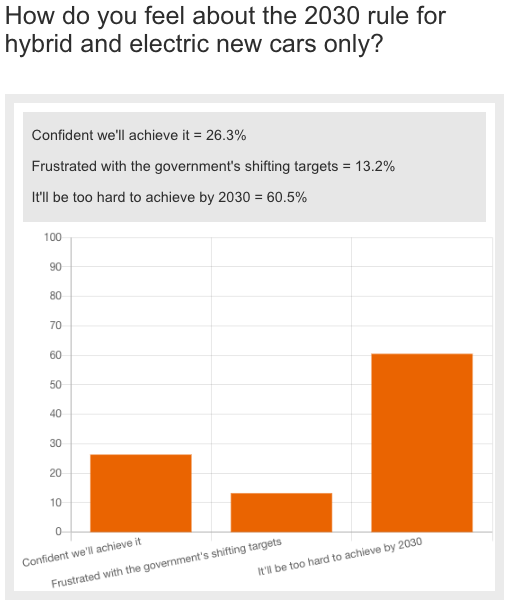The Government’s deadline for a 2030 ban on the sale of new petrol and diesel vehicles is in doubt following comments from Prime Minister Rishi Sunak.
The Prime Minister said the UK would make progress towards net zero, but it would be done in a “proportionate and pragmatic way”.
Conservative MPs are reported to be putting pressure on Sunak due to the hot political debate over the expansion of the Ultra Low Emission Zone in London.
There has been no official decision to delay the ban on the sale of new petrol and diesel vehicles, but Sunak told reporters yesterday: “…I’m cognizant that we’re living through a time where inflation is high and that’s having an impact on households and families’ bills.
“I don’t want to do anything to add to that, I want to make it easier.
“Yes we’re going to make progress towards net zero, but we’re going to do it in a proportionate and pragmatic way that doesn’t unnecessarily give people more hassle and more costs in their lives.”
A spokesperson for the Prime Minister said the Government is “making sure we listen to consumers and business” and will “continually scrutinise” existing plans for net zero by 2050.
The Government had previously said it would end the sale of new internal combustion engine (ICE) cars and vans by 2040.
However, in announcing a 10-point plan to tackle climate change in November 2020, Boris Johnson’s Government brough forward the ICE ban by 10 years.
The Government said as recently as March this year that it would be sticking to the 2030 deadline, as well as an EV sales mandate.
Government’s proposed minimum EV sales target begins at 22% in 2024, increasing to 80% in 2030 reaching 100% in 2035.
The proposed minimum EV target trajectory for new vans sold begins at 10% in 2024 and reaches 70% in 2030 on the way to 100% in 2035.
Only vehicles with a zero emissions range of over 120 miles will be covered by the mandate.
A previous AM reader poll shows that a quarter think the deadline is doable, but over 60% believe the 2030 deadline “will be too hard to acheive”.

Philip Nothard, Insight Director, Cox Automotive: “While some will welcome a prospective delay, others will find the idea abhorrent – from an environmental and commercial point of view.
“I imagine there will be considerable anger from many OEMs at the prospect of any change, especially if it’s coming from the cynical perspective of attracting votes.
“The 2030 deadline was always ambitious and its misalignment with the rest of Europe an irritant, but OEMs, their global supply chains, and an entire emerging sector of infrastructure partners have committed all they have to this timetable. Many will believe a U-turn now simply unimaginable.
“Incentives from the UK government are crucial to encourage and support consumer transition to battery electric vehicles (BEV) and accelerate the shift towards sustainable transportation.
“Any deviation at this stage must be down to pragmatism and what’s best for the transition to ‘zero tailpipe’, the automotive sector and the car buying public, not simply as a tactic to curry favour with voters.”
